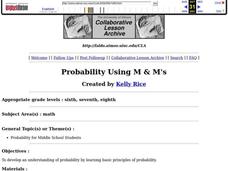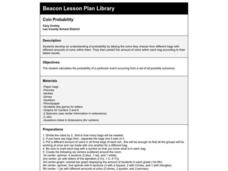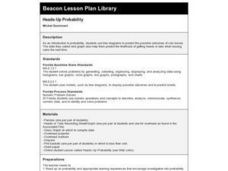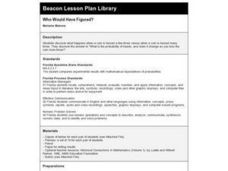Curated OER
Musher Graphing and Probability
Students use the internet to research statistical information on the musher dogs participating in the Iditarod. Using the data, they create three different types of pie charts. They use the charts to answer questions about the dogs. They...
Curated OER
If Horatio Drove Today
Students analyze and calculate expenses using the historic Horatio's road trip.
Mathematics is taught using a cross curricular approach.
Curated OER
Fire Fighting Crew
Students use the concepts in statistics to make decisions. They calculate the mean, median and mode. They compare one firefighter against another and analyze the data. They share their information with the class.
Curated OER
True Grid
Students explore probability by predicting the probability of the occurrence of each color in a sample of M&Ms.
Curated OER
ng Data: Probability, What's in the bag?
Students use the language associated with probability to discuss events including those with equally likely outcome. They collect data from a simple experiment and record in a frequency table: estimate probabilities based on this data
Curated OER
Ice Creams
Students list all the outcomes for single events, and for two successive events in a systematic way. When dealing with a combination of two experiments, they identify all the outcomes, using diagrammatic, tabular or other forms of...
Curated OER
How Does Probability Relate to Radon?
Students read an article about probability and radon. They practice using a hand held geiger counter to understand the properties of radiation and radioactivity. They identify the harmful and helpful effects of radiation as well.
Curated OER
A Game of Chance
Students explore probability through cooperative group activities and interactive video technique.
Curated OER
Probability of a Boy
Learners investigate the concept of even change by participating in a coin flip activity. They research using the Internet to investigate the chance of giving birth to a boy.
Curated OER
ExplorA-Pond:3rd Grade Probability
Third graders cut a map of a pond into grid squares. They count the total number of squares and calculate the probability of drawing a pond piece vs. a shoreline piece. They draw 10 pieces and compare the results with the original...
Curated OER
Probability: Playing with Fire
Students use probability to determine how likely it is for each tree in a small forest to catch on fire.
Curated OER
Probability Using M & M's
Young scholars develop an understanding of probability by sorting bags of M & M's by color and recording the results in percents. The data is entered onto a spreasdsheet and graphed.
Curated OER
Is the Probability Probable?
Third graders compare experimental results with mathematical expectations of probabilities. They utilize a worksheet imbedded in this plan to gain practice with the concept of probability.
Curated OER
Coin Probability
Fourth graders, in pairs, receive three different types of coin bags. They pick coins out of the bag and tally what was picked fifteen times. They do it with all three bags for three separate tallies.
Curated OER
Heads-Up Probability
Second graders use tree diagrams to predict the possible outcomes of coin tosses. The data they collect and graph also help them predict the likelihood of getting heads or tails when tossing coins the next time.
Curated OER
Probability or Ability?
Young scholars toss candy and coins using their non-dominant hand while their partners records the results on a probability charts.
Curated OER
Probability or Ability?
Pupils use their non-dominant hand to catch candy which they tossed in the air. They estimate how many they catch in a second round. They record and determine how the probability changed the second time.
Curated OER
Who Would Have Figured?
Students investigate what happens when a coin is tossed a few times versus many times. They analyze, in groups, the data from tossing coins, and the Law of Large Numbers.
Curated OER
You May Already Be a Winner!
Second graders flip coins and tally the outcomes. They play the You May Already Be a Winner! game with cards under their chairs. Some cards are winners, some might be and the others are not. They play to explain the probability concept.
Curated OER
The M&M's Brand Chocolate Candies Counting Book
First graders use estimation skills and gather data and record their findings
Curated OER
Probably Pistachio
First graders practice making logical predictions from information they are given.
Curated OER
Drawing Conclusions
Middle schoolers play a probability game, then design and complete a probability problem concerning changing odds.
Curated OER
Time-Axis Fallacy and Bayes Theorem
Students determine that knowledge of an event's outcome can affect the probability of the unknown outcome of an event that has already occurred.

























